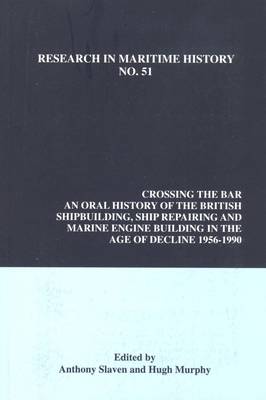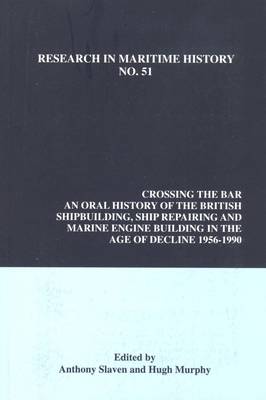
- Retrait gratuit dans votre magasin Club
- 7.000.000 titres dans notre catalogue
- Payer en toute sécurité
- Toujours un magasin près de chez vous
- Retrait gratuit dans votre magasin Club
- 7.000.000 titres dans notre catalogue
- Payer en toute sécurité
- Toujours un magasin près de chez vous
Crossing the Bar
An Oral History of the British Shipbuilding, Ship Repairing and Marine Engine-Building Industries in the Age of Decline, 1956-1990
84,95 €
+ 169 points
Description
This book is a collection of sixty interviews with key figures in British shipbuilding, ship repair, and marine engine-building industries across the United Kingdom, plus government and civil service members in the sector from the 1960s to the 1980s. The aim of the project is to understand the economic, social, and political environment of the shipping industry from the perspective of those who worked in it. The interviews place the twentieth century decline of British shipbuilding into a firm context. The topics covered include international competition (a recurring, pertinent theme); labour difficulties; industry modernisation; the attitude of shipowners; the strong belief in traditional methods which kept many of those in the industry from recognising the cheaper, faster, and better quality work taking place overseas and leaving Britain behind; ship production and production control; the postwar boom; shipyard overcrowding; the decline of the domestic industry in favour of the international; marketing weaknesses; trade disputes and trade unions; and nationalisation and privatisation concerns. Opinions and viewpoints often conflict, particularly between the perspectives of those working within the industry and the civil servants working outside of it, but the interviews are presented as a unit, and the reader is encouraged to draw their own conclusion. The result is a unique historical archive that offers a multitude of firsthand perspectives on the British shipping decline, open to interpretation by historians and future researchers. It includes a preface, introduction, and select bibliography. The interviews are grouped together by location and role.
Spécifications
Parties prenantes
- Editeur:
Contenu
- Nombre de pages :
- 270
- Langue:
- Anglais
- Collection :
- Tome:
- n° 51
Caractéristiques
- EAN:
- 9781927869017
- Date de parution :
- 01-01-13
- Format:
- Livre broché
- Format numérique:
- Trade paperback (VS)
- Dimensions :
- 234 mm x 155 mm
- Poids :
- 453 g






